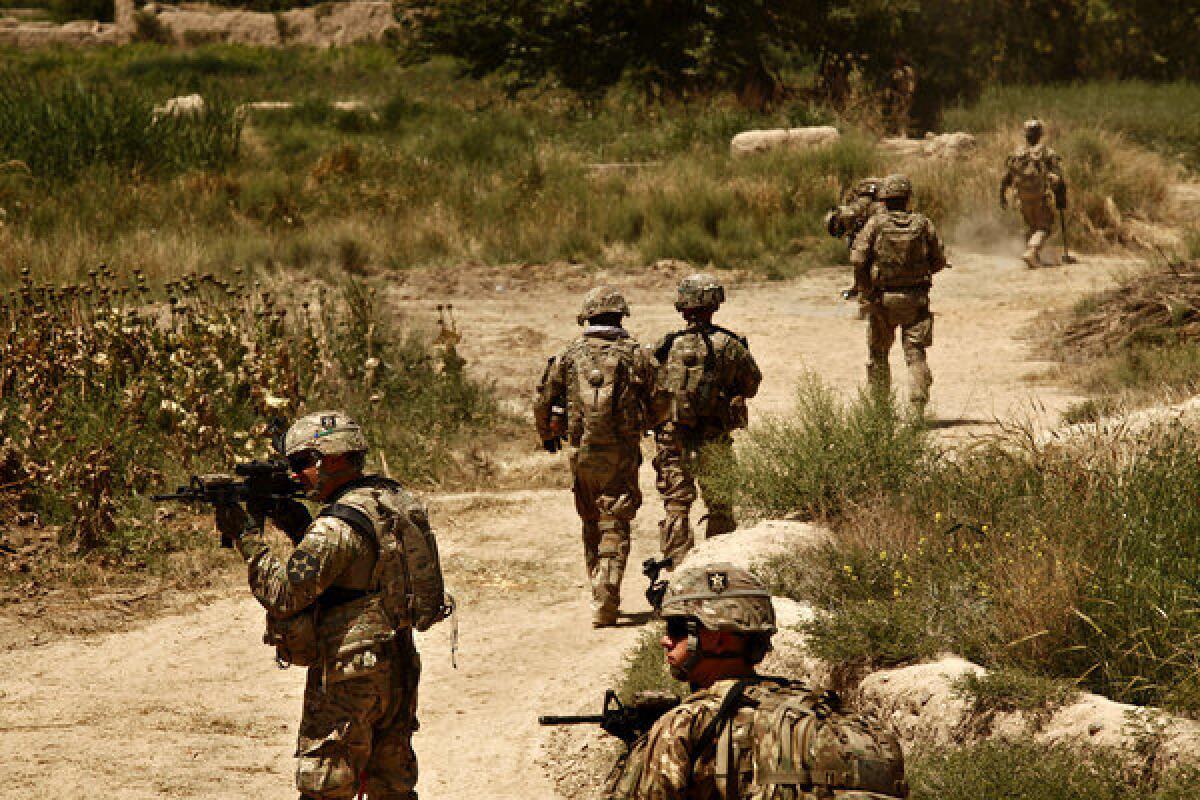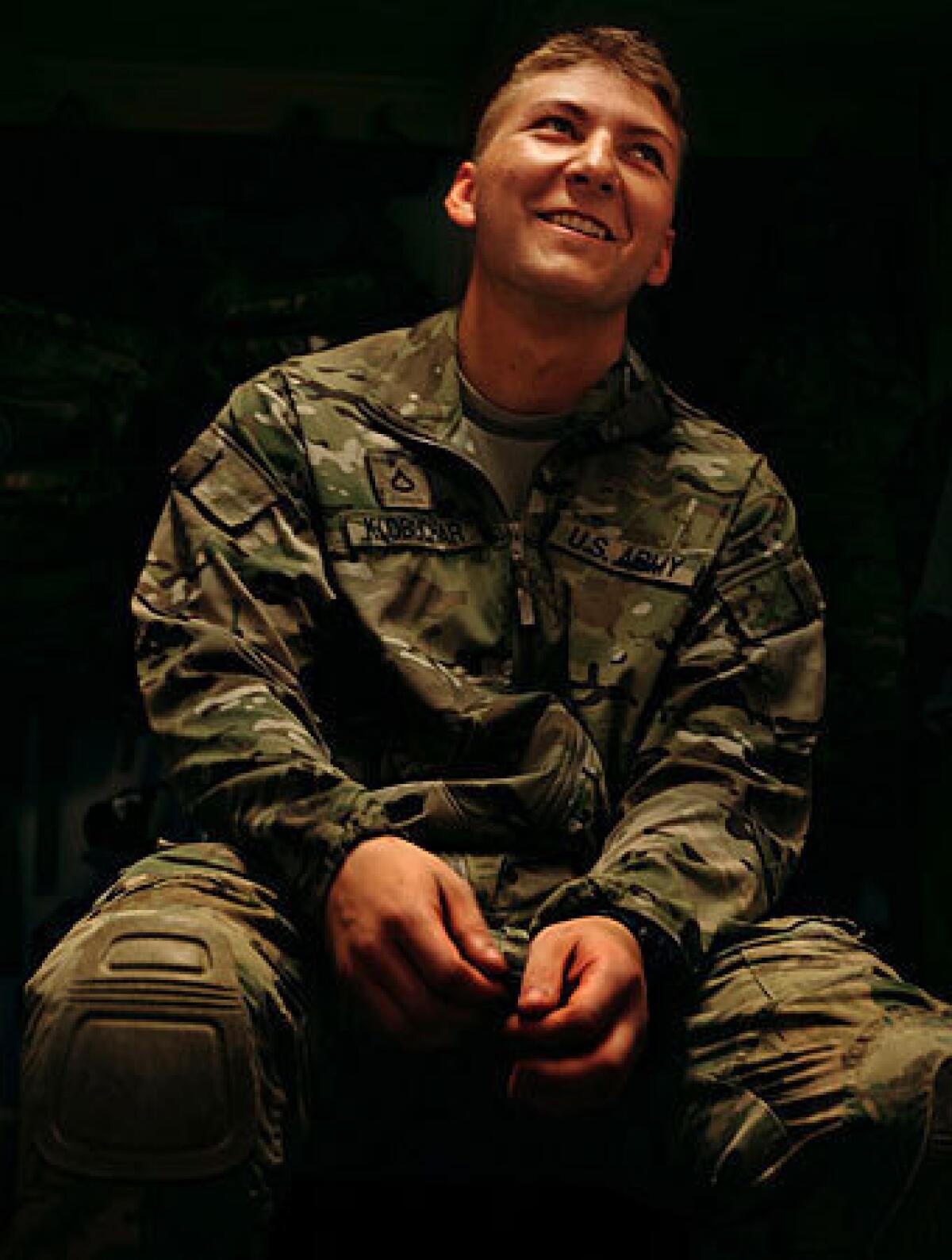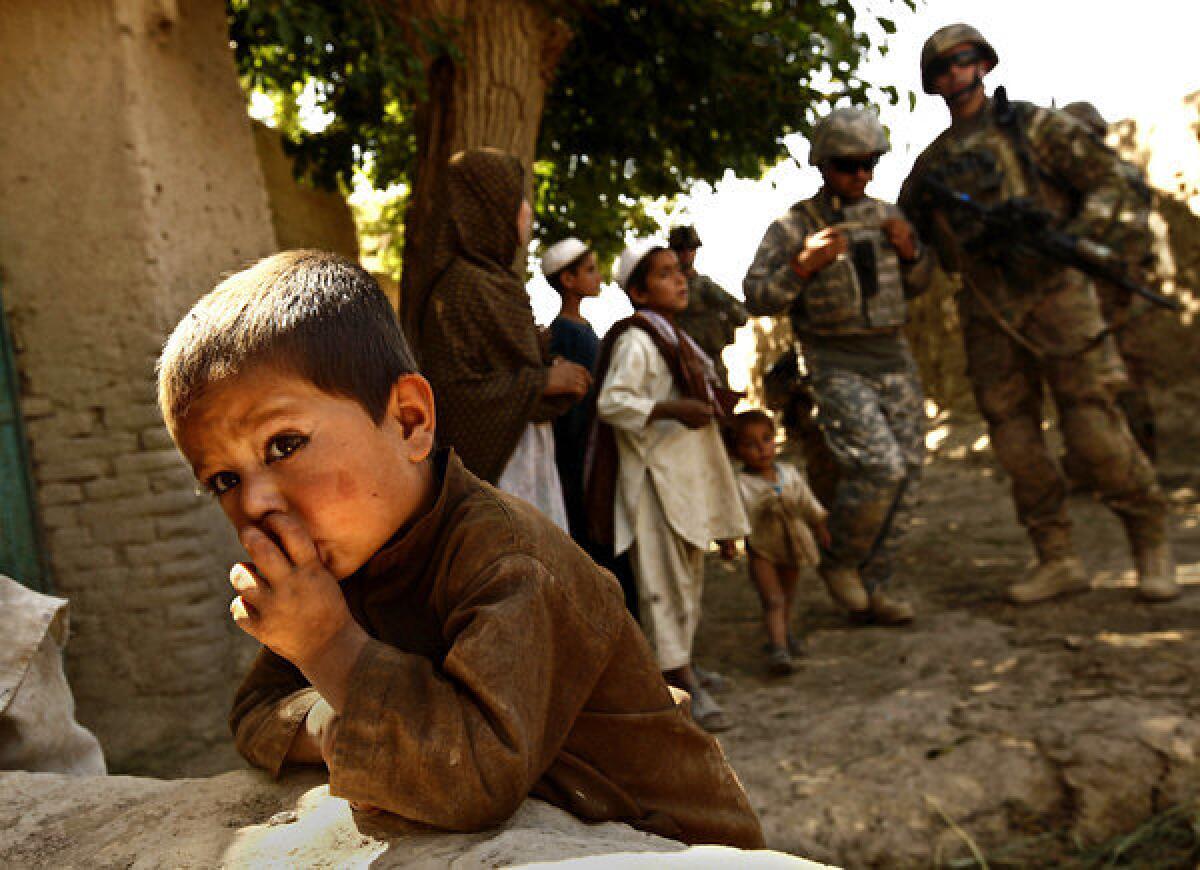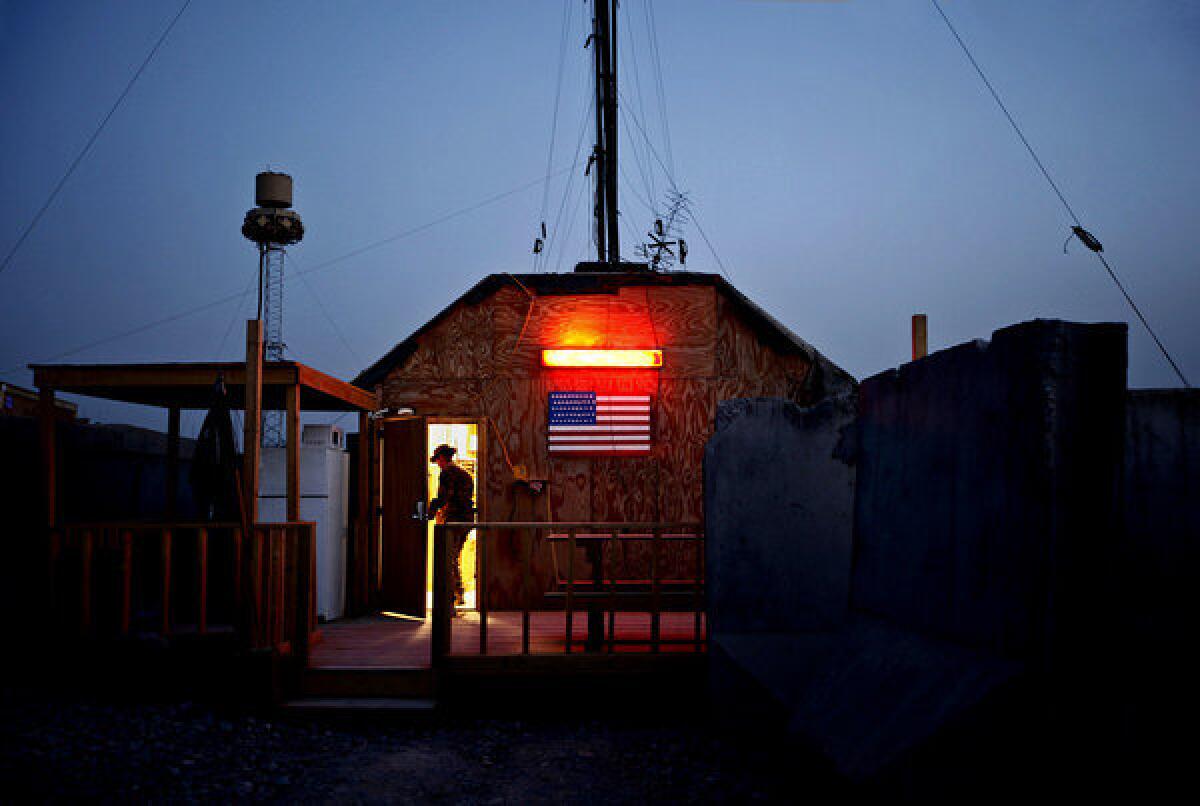Staying alive for one last patrol in Afghanistan
Minesweeper Kyle Klobuchar helps keep every member of his platoon alive in Kandahar province for seven months. But the intensity of the work takes its toll.
- Share via

Spc. Kyle Klobuchar spends his days listening intently to the beeps, hums and warbles of a hand-held explosives detector known as a Minehound.
He likes to think of the tones as the warble of either a baby turkey, adolescent turkey or adult turkey. Each tone indicates the presence of metal, copper wire, explosives or other components of the roadside bombs known as IEDs.
So naturally Klobuchar's buddies in 3rd Platoon, Comanche Company gave him a nickname: the Bomb Whisperer.
In the seven months since arriving here in western Kandahar province, the easygoing 22-year-old from a small town in Minnesota had uncovered more than a dozen of the crude but lethal improvised explosive devices.
Now he was taking the lead on one more mission: the platoon's last combat patrol in Afghanistan before packing up and heading home.
The commander of the U.S.-trained Afghan militia in this mud-walled village was missing. American officers at the nearby U.S. military base had their doubts about Lal Mohammad, a former Taliban member who had switched sides. They didn't entirely trust his militia, either, though it was formed to protect Khogiano from insurgents. Now they needed to know what had become of its leader.
The infantrymen of 3rd Platoon were dispatched to Khogiano to find out.
The platoon hadn't lost a single man during more than 70 patrols since arriving in November. Its leader, 1st Lt. Aubrey Ingalls, was determined to make this final mission as safe as those before it.

Spec. Kyle Klobuchar says he was "somewhat volunteered" to become a counter-IED specialist. More photos
"Play your A game," Ingalls, 35, told his men as they strapped on body armor and readied their weapons. "It would be a shame if we let up on our last patrol and somebody got hurt."
U.S. combat units in Afghanistan are going outside the wire — leaving their bases — less often as combat responsibilities are turned over to Afghan security forces. But each remaining patrol presents its own unique hazards, and each is an exercise in caution, procedure and diligence.
The platoon, part of the 4th Battalion, 9th Infantry Regiment, had been fired on by insurgents on more than a dozen previous patrols. But the infantrymen's biggest fear remained the roadside bomb, typically made from fertilizer and fuel oil packed into buried plastic jugs.
Just two days earlier, five U.S. soldiers had been killed by a bomb 12 miles away. Roadside bombs are the biggest killer of American troops in Afghanistan, responsible for 60% of U.S. and coalition troops killed or wounded in 11 years of war, according to a coalition spokesman. Of the 46 U.S. troops who have died this year, 14 have been killed by homemade bombs, says icasualties.org, a website that tracks military deaths.
Just after he arrived on his first deployment in November, Klobuchar had been "somewhat volunteered," as he put it, to train as a counter-IED specialist.
Klobuchar said he loves his job, but the intense pressure and concentration required to keep his friends alive was wearing him down after nearly seven months.
"You can't afford to break concentration," he said, "even for a second."

It would be a shame if we let up on our last patrol and somebody got hurt."— 1st Lt. Aubrey Ingalls
On this last patrol, Klobuchar swept the wand-like Minehound across a paved road and then a dirt path. He scanned the ground for telltale wires, or for depressions that might be bomb pressure plates.
Ahead of him, a remote-controlled contraption the size of a riding lawn mower kicked up whirls of dust as an operator with a hand-held console sent it chugging down the dirt path. This was a DOK-ING dozer, a Croatian-made minesweeper equipped with rapidly spinning chains that flail and churn, digging up or safely detonating buried bombs.
As the trail was cleared, a "path of life" was marked in red chalk. Infantrymen were instructed to stay strictly within the path — and to scream at, or roughly yank back, anyone who strayed.
The soldiers stepped warily as they scanned poppy fields and grape vineyards for another common threat: insurgents who open fire from the cover of the lush greenery that spreads for miles along the fertile valley.
"When we first got here, we thought every step we took was going to be an IED," said Spc. Jeffrey Wright, 22, of Riverside. Since then, he said, the infantrymen have put their lives, and their abiding trust, in the hands of young Kyle Klobuchar.
The patrol paused several times at the sight of men emerging from distant fields. Lt. Ingalls used his rifle scope to focus on three faraway figures, looking for weapons or suicide vests. The men were either farmers or Taliban lookouts, he concluded. He radioed their descriptions and moved on.
As the infantrymen turned the narrow corners formed by rough mud walls that lined the poppy fields, small boys rushed up to greet them. They begged for pens or food. A few reached out to touch the soldiers' uniforms. Their hands were gently pushed aside, and the infantrymen gestured for them to keep their distance.
The men had been in Afghanistan long enough to be wary of everyone. Insurgents have sometimes outfitted boys with suicide bomb vests.
Around a bend, the patrol encountered a young man in white robes and prayer cap toting an AK-47. This was Sadar Mohammad, younger brother of Lal Mohammad.
Lal Mohammad's disappearance was no mystery to him, the young man said: His brother had been driving their ill mother to a hospital in the city of Kandahar, about 20 miles away, when he was intercepted and kidnapped by Taliban gunmen.

Many of the village children come out to greet the platoon, begging for pens or other trinkets. The troops warn them not to get too close, knowing that militants aren't above using even children to detonate bombs. More photos
The patrol got the same story at Lal Mohammad's compound in a pomegranate grove nearby. His cousin Shad Mohammad Gul, 22, a sunburned villager with a worn AK-47, said the rest of the 15-man militia had left to search for their missing commander. He and Samaddin Alizi, 20, a chubby man with his pants hitched up high, had been left behind to guard the compound.
A U.S. civilian contractor accompanying the patrol questioned the two militiamen through an interpreter. They said they had received weapons training from U.S. forces but had not been provided any sort of militia ID card.
The contractor took the men's fingerprints and performed retina scans with a hand-held sensor. An interpreter filled out a form with the men's biographical information. Under "goals" on the form, both men answered, "Peace in my village."
The information about Lal Mohammad's apparent fate, along with the militiamen's details, would be passed on to intelligence officers at nearby Forward Operating Base Zangabad. The information also would be provided to the district police chief, Sultan Mohammad, a well-connected local who doubtlessly already knew about the missing commander.

The infantrymen headed back to base, carefully retracing their steps. As they walked through the security gate, there were a few mild whoops and shouts, mostly of relief. Their combat mission to Afghanistan was now nearly over, and everyone was alive and whole.
"Hey, man, we owe you about six beers!" one infantryman hollered at Klobuchar. Another soldier told him, "You saved our lives."
Spc. Wright sighed as he removed his sweaty body armor. "That's definitely a big burden off our shoulders," he said. He was looking forward to seeing his mother in Riverside.

Capt. Daniel Mitchell, 30, of Olympia, Wash., enters the Comanche Company command center at its outpost in Kandahar province, Afghanistan. More photos
For Lt. Ingalls, the end of the patrol almost certainly represented the end of his combat career. His men were safe. They were going home, and he felt an overwhelming sense of completion and relief.
As for the missing Lal Mohammad, the lieutenant had no idea what might have become of him.
"He's either a new-old member of the Taliban," he said, "or maybe he's a head shorter."
Klobuchar was drained. "It's so stressful," he said, his face slick with sweat. "You always have to be zoned in. You can't ever get distracted."
Now his bomb-hunting career is over; it wasn't likely he'd be sent back to Afghanistan.
There's one thing in particular he won't miss: "I hope I never have to see a Minehound again."
Sign up for Essential California
The most important California stories and recommendations in your inbox every morning.
You may occasionally receive promotional content from the Los Angeles Times.









